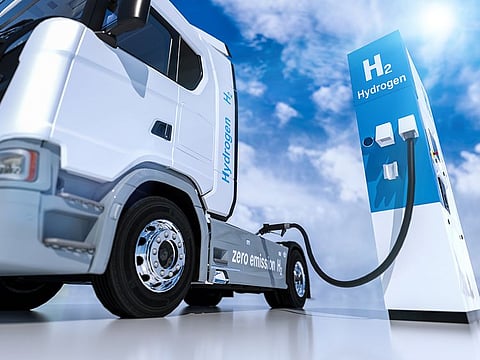Setting the standard for sustainability in the UAE
It is our collective responsibility to strive for a more sustainable future

Imagine a world without the logistics and transportation industry. Its absence would mean almost no cross-border trade and huge implications on global economies, supply chains, and the movement of goods and services, including essential services.
With its origin traced to ancient civilizations, the sector has been a backbone of human progress for thousands of years and continues to play a crucial role in supporting economic development and almost every business in the world.
As the world advances, the role of logistics and transportation is becoming more critical than ever before. Thanks to modern technologies, including innovative modes of transportation in addition to planes, ships, trucks, and trains, the sector has seen a new boom in recent years.
However, all this comes at a price as the sector has been among the major contributors to global Green House Gas (GHG) emissions. For example, freight transportation globally contributes about 8% of GHG emissions and as much as 11% when warehouses and ports are included. Moreover, freight transportation is projected to become the highest emitting sector by 2050 under business-as-usual scenarios.
The rise of plastics
In addition, packaging and material, including plastics used in the logistics and transportation industry, is another major issue contributing to environmental pollution.
Looking at the growing issues associated with plastics, World Environment Day this month also put a spotlight on the pressing issue of plastics.
Though plastic has been one of the most useful materials used in different industries ever since it was produced in 1907 that marked the beginning of the plastics industry globally. Its use, rather a misuse in the past few decades, poses significant environmental challenges—leading to pollution of our water bodies, land, and ecosystems and causing enormous harm to wildlife and marine life.
Also Read: How the UAE leads the green path
Estimates show that global plastics production soared to more than 460 million tonnes (Mt) in recent years compared to 234 million tonnes (Mt) in 2000. Also, over the past two decades, global annual plastic waste has more than doubled, reaching 353 Mt from 156 Mt. Furthermore, about two-thirds of all plastic waste comes from applications with lifespans of less than five years: packaging (40%), consumer products (12%) and textiles (11%).
What's more, almost all the single-use plastic products (98 percent) are produced from fossil fuel, or "virgin" feedstock, and the GHG emission level associated with the production, use, and disposal of conventional fossil fuel-based plastics is forecasted to grow to 19 percent of the global carbon budget by 2040.
Amid growing environmental concerns, several logistics and transportation companies worldwide are adopting sustainable approaches, and one such prominent company that is leading by example is Aramex.
Headquartered in Dubai – just a few miles from the venue that will host COP28 this year, our company's commitment to sustainability is evident from the fact that we were the first company in the Middle East region to adopt sustainability reporting in 2007.
Walking the Talk
The company is investing in renewable energy without compromising customer expectations and service quality. We believe that the entire logistics industry can play an essential role in closing the loop, and we also recognise the vital role of suppliers and value chain cooperation in reverse logistics, which aligns with the principles of the 5 Rs: Reduce, Repair, Resell, Refurbish, and Recycle.
Although Aramex has demonstrated a commitment to sustainability, the logistics and transportation industry as a whole must continue pushing boundaries to drive positive environmental change.
This includes scaling up innovative ways to decrease dependence on plastics and embrace substitutes. It cannot be done alone, as it's our collective responsibility to bring about a transformation and strive for a more sustainable future.
Raji Hattar is the Chief Sustainability Officer at Aramex



